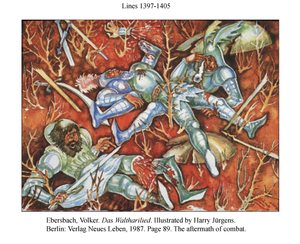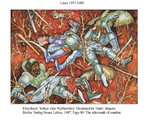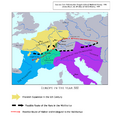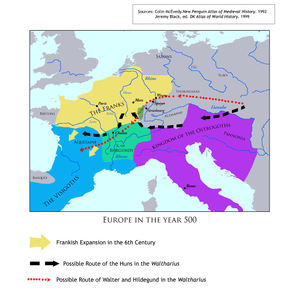Difference between revisions of "Waltharius1396"
| Line 417: | Line 417: | ||
|[[Waltharius1376|« previous]] | |[[Waltharius1376|« previous]] | ||
|{{Outline| | |{{Outline| | ||
| − | * Prologue | + | * [[WalthariusPrologue|Prologue]] |
| − | * Introduction: the Huns (1–12) | + | * [[Waltharius1|Introduction: the Huns (1–12)]] |
* The Huns (13–418) | * The Huns (13–418) | ||
| − | ** The Franks under Gibich surrender to Attila, giving Hagen as a hostage (13–33) | + | ** [[Waltharius13|The Franks under Gibich surrender to Attila, giving Hagen as a hostage (13–33)]] |
| − | ** The Burgundians under Hereric surrender to Attila, giving Hildegund as a hostage (34–74) | + | ** [[Waltharius34|The Burgundians under Hereric surrender to Attila, giving Hildegund as a hostage (34–74)]] |
| − | ** The Aquitainians under Alphere surrender to Attila, giving Walther as a hostage (75–92) | + | ** [[Waltharius75|The Aquitainians under Alphere surrender to Attila, giving Walther as a hostage (75–92)]] |
| − | ** Experience of the hostages at Attila’s court (93–115) | + | ** [[Waltharius93|Experience of the hostages at Attila’s court (93–115)]] |
| − | ** Death of Gibich, flight of Hagen (116–122) | + | ** [[Waltharius116|Death of Gibich, flight of Hagen (116–122)]] |
| − | ** Attila’s queen Ospirin advises her husband to ensure Walther’s loyalty by arranging a marriage (123–141) | + | ** [[Waltharius123|Attila’s queen Ospirin advises her husband to ensure Walther’s loyalty by arranging a marriage (123–141)]] |
| − | ** Walther rejects Attila’s offer of a bride (142–169) | + | ** [[Waltharius142|Walther rejects Attila’s offer of a bride (142–169)]] |
| − | ** Walther leads the army of the Huns to victory in battle (170–214) | + | ** [[Waltharius170|Walther leads the army of the Huns to victory in battle (170–214)]] |
** The Escape (215–418) | ** The Escape (215–418) | ||
| − | *** Walther returns from battle and encounters Hildegund (215–255) | + | *** [[Waltharius215|Walther returns from battle and encounters Hildegund (215–255)]] |
| − | *** Walther reveals to Hildegund his plans for escaping with Attila’s treasure (256–286) | + | *** [[Waltharius256|Walther reveals to Hildegund his plans for escaping with Attila’s treasure (256–286)]] |
| − | *** Walther hosts a luxurious banquet for Attila’s court; eventually all his intoxicated guests fall asleep (287–323) | + | *** [[Waltharius287|Walther hosts a luxurious banquet for Attila’s court; eventually all his intoxicated guests fall asleep (287–323)]] |
| − | *** Flight of Walther and Hildegund from Attila’s court (324–357) | + | *** [[Waltharius324|Flight of Walther and Hildegund from Attila’s court (324–357)]] |
| − | *** The following day, the escape of Walther and Hildegund is discovered by Ospirin (358–379) | + | *** [[Waltharius358|The following day, the escape of Walther and Hildegund is discovered by Ospirin (358–379)]] |
| − | *** Attila is infuriated and vows revenge on Walther, but can find no one willing to dare to pursue him, even for a large reward (380–418) | + | *** [[Waltharius380|Attila is infuriated and vows revenge on Walther, but can find no one willing to dare to pursue him, even for a large reward (380–418)]] |
* The Single Combats (419–1061) | * The Single Combats (419–1061) | ||
** Diplomacy (419–639) | ** Diplomacy (419–639) | ||
| − | *** Flight of Walther and Hildegund to the area of Worms (419–435) | + | *** [[Waltharius419|Flight of Walther and Hildegund to the area of Worms (419–435)]] |
| − | *** Gunther, King of the Franks, learns of Walther’s presence on his territory and, despite Hagen’s warnings, decides to pursue him for his treasure (436–488) | + | *** [[Waltharius436|Gunther, King of the Franks, learns of Walther’s presence on his territory and, despite Hagen’s warnings, decides to pursue him for his treasure (436–488)]] |
| − | *** Walther makes his camp in a mountainous area and goes to sleep (489–512) | + | *** [[Waltharius489|Walther makes his camp in a mountainous area and goes to sleep (489–512)]] |
| − | *** Gunther and his companions approach Walther’s camp; Hagen unsuccessfully tries to dissuade the king from attacking it (513–531) | + | *** [[Waltharius513|Gunther and his companions approach Walther’s camp; Hagen unsuccessfully tries to dissuade the king from attacking it (513–531)]] |
| − | *** Hildegund sees the Franks approaching and wakes Walther, who calms her fears and prepares for battle; he recognizes Hagen from a distance (532–571) | + | *** [[Waltharius532|Hildegund sees the Franks approaching and wakes Walther, who calms her fears and prepares for battle; he recognizes Hagen from a distance (532–571)]] |
| − | *** Hagen persuades Gunther to try diplomacy before using force (571–580) | + | *** [[Waltharius571|Hagen persuades Gunther to try diplomacy before using force (571–580)]] |
| − | *** Camalo is sent as a messenger to Walther, who offers to make Gunther a gift in return for allowing his passage (581–616) | + | *** [[Waltharius581|Camalo is sent as a messenger to Walther, who offers to make Gunther a gift in return for allowing his passage (581–616)]] |
| − | *** Hagen counsels Gunther to accept the offer, but Gunther rejects this advice, calling him a coward. Insulted, Hagen goes off to a nearby hill (617–639) | + | *** [[Waltharius617|Hagen counsels Gunther to accept the offer, but Gunther rejects this advice, calling him a coward. Insulted, Hagen goes off to a nearby hill (617–639)]] |
** Combat (640–1061) | ** Combat (640–1061) | ||
| − | *** 1st single combat: Camalo is sent back to Walther, who slays him (640–685) | + | *** [[Waltharius640|1st single combat: Camalo is sent back to Walther, who slays him (640–685)]] |
| − | *** 2nd single combat: Walther slays Kimo/Scaramund, Camalo’s nephew (686–719) | + | *** [[Waltharius686|2nd single combat: Walther slays Kimo/Scaramund, Camalo’s nephew (686–719)]] |
| − | *** Gunther encourages his men (720–724) | + | *** [[Waltharius720|Gunther encourages his men (720–724)]] |
| − | *** 3rd single combat: Walther slays Werinhard, a descendant of the Trojan Pandarus (725–753) | + | *** [[Waltharius725|3rd single combat: Walther slays Werinhard, a descendant of the Trojan Pandarus (725–753)]] |
| − | *** 4th single combat: Walther slays the Saxon Ekivrid, after an exchange of insults (754–780) | + | *** [[Waltharius754|4th single combat: Walther slays the Saxon Ekivrid, after an exchange of insults (754–780)]] |
| − | *** 5th single combat: Walther slays Hadawart, after an exchange of insults (781–845) | + | *** [[Waltharius781|5th single combat: Walther slays Hadawart, after an exchange of insults (781–845)]] |
| − | *** Hagen sees his nephew Patavrid going off to fight Walther and laments the evil wreaked on mankind by greed (846–877) | + | *** [[Waltharius846|Hagen sees his nephew Patavrid going off to fight Walther and laments the evil wreaked on mankind by greed (846–877)]] |
| − | *** 6th single combat: after trying to dissuade him from fighting, Walther slays Patavrid (878–913) | + | *** [[Waltharius878|6th single combat: after trying to dissuade him from fighting, Walther slays Patavrid (878–913)]] |
| − | *** 7th single combat: Walther slays Gerwitus (914–940) | + | *** [[Waltharius914|7th single combat: Walther slays Gerwitus (914–940)]] |
| − | *** Gunther again encourages his men, giving Walther some time to rest (941–961) | + | *** [[Waltharius941|Gunther again encourages his men, giving Walther some time to rest (941–961)]] |
| − | *** 8th single combat: Walther is shorn of his hair by Randolf, whom he then slays (962–981) | + | *** [[Waltharius962|8th single combat: Walther is shorn of his hair by Randolf, whom he then slays (962–981)]] |
| − | *** Walther is attacked by Eleuthir/Helmnot, assisted by Trogus, Tanastus, and Gunther; he slays all but Gunther (981–1061) | + | *** [[Waltharius981|Walther is attacked by Eleuthir/Helmnot, assisted by Trogus, Tanastus, and Gunther; he slays all but Gunther (981–1061)]] |
* The Final Combat (1062–1452) | * The Final Combat (1062–1452) | ||
| − | ** Gunther tries to persuade Hagen to help him to defeat Waltharius; remembering his wounded honor, Hagen refuses (1062–1088) | + | ** [[Waltharius1062|Gunther tries to persuade Hagen to help him to defeat Waltharius; remembering his wounded honor, Hagen refuses (1062–1088)]] |
| − | ** Hagen changes his mind and agrees to help Gunther, but advises that they must lie low wait until Walther comes down from the mountains into open ground (1089–1129) | + | ** [[Waltharius1089|Hagen changes his mind and agrees to help Gunther, but advises that they must lie low wait until Walther comes down from the mountains into open ground (1089–1129)]] |
| − | ** Walther decides to spend the night in the mountains. He rematches the severed heads with the bodies of his victims, prays for their souls, then sleeps (1130–1187) | + | ** [[Waltharius1130|Walther decides to spend the night in the mountains. He rematches the severed heads with the bodies of his victims, prays for their souls, then sleeps (1130–1187)]] |
| − | ** The following day, Walther and Hildegund set out from the mountains, taking the horses and arms of the defeated warriors (1188–1207) | + | ** [[Waltharius1188|The following day, Walther and Hildegund set out from the mountains, taking the horses and arms of the defeated warriors (1188–1207)]] |
| − | ** Hildegund perceives Gunther and Hagen approaching to attack; the king addresses Walther (1208–1236) | + | ** [[Waltharius1208|Hildegund perceives Gunther and Hagen approaching to attack; the king addresses Walther (1208–1236)]] |
| − | ** Walther ignores Gunther and pleads with Hagen to remember the bond of their childhood friendship; Hagen counters that Walther has already broken their faith by slaying Patavrid (1237–1279) | + | ** [[Waltharius1237|Walther ignores Gunther and pleads with Hagen to remember the bond of their childhood friendship; Hagen counters that Walther has already broken their faith by slaying Patavrid (1237–1279)]] |
| − | ** The fight begins and continues for seven hours; Gunther foolishly tries to retrieve a thrown spear from the ground near Walther and is only saved from death by Hagen’s brave intervention (1280–1345) | + | ** [[Waltharius1280|The fight begins and continues for seven hours; Gunther foolishly tries to retrieve a thrown spear from the ground near Walther and is only saved from death by Hagen’s brave intervention (1280–1345)]] |
| − | ** Walther challenges Hagen; he severs Gunther’s leg, but Hagen again saves the king’s life (1346–1375) | + | ** [[Waltharius1346|Walther challenges Hagen; he severs Gunther’s leg, but Hagen again saves the king’s life (1346–1375)]] |
| − | ** Hagen cuts off Walther’s right hand; Walther gouges out one of Hagen’s eyes and, cutting open his cheek, knocks out four teeth (1376–1395) | + | ** [[Waltharius1376|Hagen cuts off Walther’s right hand; Walther gouges out one of Hagen’s eyes and, cutting open his cheek, knocks out four teeth (1376–1395)]] |
** '''Having wounded each other, the warriors end the battle, drink together, and engage in a friendly exchange of humorous taunt (1396–1442)''' | ** '''Having wounded each other, the warriors end the battle, drink together, and engage in a friendly exchange of humorous taunt (1396–1442)''' | ||
| − | ** The warriors return to their respective homes; Walther marries Hildegund and eventually becomes king of the Aquitainians (1443–1452) | + | ** [[Waltharius1443|The warriors return to their respective homes; Walther marries Hildegund and eventually becomes king of the Aquitainians (1443–1452)]] |
| − | * Epilogue (1453–1456)}} | + | * [[Waltharius1453|Epilogue (1453–1456)]])}} |
| | | | ||
|[[Waltharius1443|next »]] | |[[Waltharius1443|next »]] | ||
Revision as of 22:51, 28 August 2009
Having wounded each other, the warriors end the battle, drink together, and engage in a friendly exchange of humorous taunt (1396–1442)
| Tali negotio dirimuntur proelia facto. | Aeineid 5.467: proelia voce diremit. ‘With his voice he broke off the fight.’
|
??????? | ||||
| Quemque suum vulnus atque aeger anhelitus arma | Aeineid 5.432: quatit aeger anhelitus artus. ‘A painful gasping shakes his huge frame.’
|
DSSDDS Elision: atque aeger False quantities: vulnus |
||||
| Ponere persuasit. quisnam hinc immunis abiret, | DSSSDS Elision: quisnam hinc |
|||||
| Qua duo magnanimi heroes tam viribus aequi | Aeineid 6.649: magnanimi heroes. . . ‘High-souled heroes. . .’ 12.230-231.: viribus aequi/ non sumus? ‘Are we not their match in might?’
|
DDSSDS Elision: magnanimi heroes |
||||
| Quam fervore animi steterant in fulmine belli? | 1400 | Aeneid 6.842: fulmina belli. . . ‘Thunderbolts of war. . .’
|
SDDSDS Elision: fervore animi |
|||
| Postquam finis adest, insignia quemque notabant: | Insignia equiv. to vulnera, ironic.
|
SDSDDS | ||||
| Illic Guntharii regis pes, palma iacebat | SDSSDS | |||||
| Waltharii nec non tremulus Haganonis ocellus. | DSDDDS | |||||
| Sic sic armillas partiti sunt Avarenses! |
|
SSSSDS | ||||
| Consedere duo, nam tertius ille iacebat, | 1405 | Tertius: Gunther
|
Aeineid 7.431: consedere duces. ‘Burn the chiefs.’
|
SDSDDS | ||
| Sanguinis undantem tergentes floribus amnem. | Aeineid 10.908: undantique. . .cruore. . . ‘In streams of blood. . .’
|
DSSSDS | ||||
| Haec inter timidam revocat clamore puellam | Aeineid 4.303: vocat clamore Cithaeron. ‘Cithaeron summons her with its din.’ 2.437: vocati clamore. ‘We are called by the clamour.’
|
SDDSDS | ||||
| Alpharides, veniens quae saucia quaeque ligavit. | Saucia quaeque equiv. to vulnera omnia
|
DDSDDS | ||||
| His ita compositis sponsus praecepit eidem: | DDSSDS | |||||
| Iam misceto merum Haganoni et porrige primum; | 1410 | SDDSDS Elision: Haganoni et Hiatus: merum Haganoni |
||||
| Est athleta bonus, fidei si iura reservet. | Si: sc. modo
|
SDDSDS | ||||
| Tum praebeto mihi, reliquis qui plus toleravi. | SDDSDS | |||||
| Postremum volo Guntharius bibat, utpote segnis | SDDDDS | |||||
| Inter magnanimum qui paruit arma virorum | SDSDDS | |||||
| Et qui Martis opus tepide atque enerviter egit.' | 1415 | Aeneid 8.516: militiam et grave Martis opus. . . ‘Warfare and the stern work of battle. . .’
|
SDDSDS Elision: tepide atque; atque enerviter |
|||
| Obsequitur cunctis Heririci filia verbis. | DSDSDS | |||||
| Francus at oblato licet arens pectore vino | DSDSDS | |||||
| Defer' ait 'prius Alpharidi sponso ac seniori, | DDDSDS Elision: sponso ac |
|||||
| Virgo, tuo, quoniam, fateor, me fortior ille | DDDSDS | |||||
| Nec solum me, sed cunctos supereminet armis.' | 1420 | Aeineid 6.856: victorque viros spereminet omnes. ‘He towers triumphant over all.’
|
SSSDDS | |||
| Hic tandem Hagano spinosus et ipse Aquitanus, | Spinosus: cf. note on line 1351.
|
SDSDDS Elision: ipse Aquitanus Hiatus: tandem Hagano |
||||
| Mentibus invicti, licet omni corpore lassi, | DSDSDS | |||||
| Post varios pugnae strepitus ictusque tremendos | DSDSDS | |||||
| Inter pocula scurrili certamine ludunt. | Georgics 2.383-384.: inter pocula laeti. . .saluere. ‘Amid their drinking they gaily danced.’
|
SDSSDS | ||||
| Francus ait: iam dehinc cervos agitabis, amice, | 1425 | Georgics 3.409: agitabis onagros. ‘You will course the wild ass.’
|
DSSDDS False quantities: extra syllable |
|||
| Quorum de corio wantis sine fine fruaris: | Wantis: “gloves,” a Germanism, cf. French gants. Fruaris equiv. to utaris
|
SDSDDS | ||||
| At dextrum, moneo, tenera lanugine comple, | Eclogue 2.51: cana legam tenera lanugine mala. ‘I will gather quinces, pale with tender down.’
|
SDDSDS | ||||
| Ut causae ignaros palmae sub imagine fallas. | SSSDDS Elision: causae ignaros |
|||||
| Wah! sed quid dicis, quod ritum infringere gentis | Ritum…gentis: cf. line 337.
|
Liber I Macchabeorum 1.66: noluerunt infringere legem Dei sanctam. ‘They would not break the holy law of God.’ Liber Genesis 34.22: ritum gentis imitantes. . . ‘Following the manner of the nation.’
|
SSSSDS Elision: ritum infringere |
|||
| Ac dextro femori gladium agglomerare videris | 1430 | Videris: passive
|
Aeineid 2.341: lateri adglomerant nostro. ‘They gather to our side.’
|
SDDDDS Elision: gladium agglomerare |
||
| Uxorique tuae, si quando ea cura subintrat, | Aeineid 9.757: si continuo victorem ea cura subisset. . . ‘If at once the victor had taken thought. . .
|
SDSDDS Elision: quando ea |
||||
| Perverso amplexu circumdabis euge sinistram? | SSSDDS Elision: perverso amplexu |
|||||
| Iam quid demoror? en posthac tibi quicquid agendum est, | SDSDDS Apheresis: agendum est |
|||||
| Laeva manus faciet.' cui Walthare talia reddit: | Aeineid 2.323: talia reddit. ‘He answers thus.’
|
DDSDDS | ||||
| Cur tam prosilias, admiror, lusce Sicamber: | 1435 | Sicamber equiv. to France. The Sicambri were an ancient Germanic tribe who lived along the Rhine, connected by tradition with the Frankish royal line.
|
SDSSDS | |||
| Si venor cervos, carnem vitabis aprinam. | SSSSDS | |||||
| Ex hoc iam famulis tu suspectando iubebis | Ex hoc: sc. tempore Suspectando: sc. oblique
|
SDSSDS | ||||
| Heroum turbas transversa tuendo salutans. | Eclogue 3.8: transversa tuentibus hircis. . . ‘While the goats looked askance. . .’
|
SSSDDS | ||||
| Sed fidei memor antiquae tibi consiliabor: | DDSDDS | |||||
| Iam si quando domum venias laribusque propinques, | 1440 | SDDDDS | ||||
| Effice lardatam de multra farreque pultam: | Lardatam: “fattened” Multra equiv. to lacte
|
DSSSDS | ||||
| Haec pariter victum tibi conferet atque medelam. | Medelam: “medicine,” i.e., a poultice for the eye.
|
DSDDDS |



